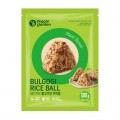Growth Asia Summit 2024
Beyond gut health: Kerry adds protein absorption to list of use for spore-forming probiotic

The spore-forming probiotic of interest is BC30, which is a patented Bacillus coagulans GBI-30, 6086 ingredient.
Speaking on the first day of our Growth Asia Summit 2024, Dr. Mathieu Millette, RD&A scientific director, Digestive Health at Kerry, pointed out how the company has been exploring new functional benefits of probiotics beyond gut health.
The three-day summit took place in Singapore’s Marina Bay Sands between July 16 and 18. Kerry is also one of the diamond sponsors of the event.
Dr. Millette was presenting on the topic “Kerry ProActive Health: Pioneering microbiome health with breakthrough science.”
BC30 is well-established in the areas of digestive and immune health, but there are new emerging areas that could be looked into.
“Gut microbiome is everywhere; it is about the microbiome surrounding our body. It’s important for supporting health, but it’s not only about the gut microbiome, but also supporting areas beyond digestive health,” he said during his presentation, giving examples such as the gut-brain, and gut-skin axis.
There is also growing evidence showing BC30’s benefits for protein absorption, said Dr. Millette, who is a microbiologist by training.
Citing findings from a 2022 paper published on Probiotics and Antimicrobial Proteins, he pointed out that BC30 supplementation, alongside pea and rice protein concentrate in a seven-week study, has shown a significant increase in total amino acids content in blood serum.
A total of 30 women between 50 and 70 years old were randomised to take either the placebo or undergo the intervention, where they had to take one billion CFU of BC30 and 27 grams of pea and rice protein concentrate for two weeks.
This is followed by a three-week washout period and a crossing over of the two groups for a further two weeks.
Findings showed that the supplementation of BC30 had significantly increased total amino acids content in the blood by 3.8 per cent.
The increase could be seen for the amino acids such as alanine, tryptophan, and cysteine.
In addition, the peak concentration of tryptophan, cysteine, essential amino acids, and total amino acids were also greater.
Dr. Millette said that Kerry has been studying the effects of BC30 on protein absorption before 2010, when an in vitro study showed that it could secrete digestive enzymes and may improve the digestion of milk-based and plant-based proteins.
“We will now continue into that direction, and the next step is to find out how does the increase of amino acids benefit consumers, is it better lean mass, muscle mass? Or could it help preserve lean and muscle mass when the person is on diet,” he said.
Watch the following video as Dr. Millette tells us more about the background and rationale for studying BC30 and its effects on protein absorption.
Top five areas of concern
Citing a 2023 Kerry survey findings, Dr. Millette said that Asia-Pacific consumers’ proactivity towards health is driving the demand for functional foods.
Based on the survey, the top five most important functional health benefits for APAC consumers were immune support, which was the case for 56.9 per cent of the survey respondents.
Digestion and gut health was a close second with 54 per cent of the respondents choosing it.
Heart, eye, and brain health were the other top five concerns.
Aside from BC30, Kerry has also conducted studies on its other functional ingredients, such as yeast beta-glucan postbiotic marketed Wellmune and its postbiotic Lacticaseibacillus paracasei 327 marketed as Plenibiotic. The former is studied for its immune health benefits and the latter on digestive and skin health.
For instance, a 2024 study by Senda-Sugimoto et al reported that there was an improvement in intestinal environment following the supplementation of Plenibiotic.
The two-week RCT involved 110 healthy adults with low bowel movement of between three to five times per week.
They were randomised to take either the placebo or 25mg of L. paracasei 327 once daily.
Intestinal microbiota analysis showed that L. paracasei 327 ingestion resulted in a trend towards an increase in Bacteroides and a significant decrease in Clostridium cluster IV in each taxonomic group as compared to the placebo group.
At the same time, defecation frequency had also increased significantly.
This suggest that L. paracasei 327 ingestion improves the intestinal environment by increasing short-chain fatty acid-producing bacteria, suppressing putrefactive-producing bacteria, and improving defecation.
Another four-week RCT showed that Plenibiotic could improve skin hydration, with a significant lower level of transepidermal water loss (TEWL).
B2C brand
Through an acquisition, Kerry also owns the Canada-origin B2C brand Bio-K+. The brand is built on three probiotic strains, namely Lactobacillus acidophilus CL1285®, Lacticaseibacillus casei LBC80R® and Lacticaseibacillus rhamnosus CLR2®.
The strains have been trialled in 115,000 people for safety and efficacy, including the prevention of antibiotic associated diarrhoea.
One of its latest trials looks at autism spectrum disorder (ASD) in children.










